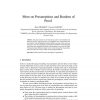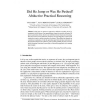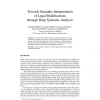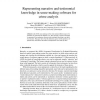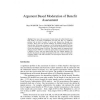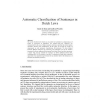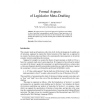JURIX
2008
14 years 2 months ago
2008
Abstract. There exist two broad approaches to information retrieval (IR) in the legal domain: those based on manual knowledge engineering (KE) and those based on natural language p...
JURIX
2008
14 years 2 months ago
2008
This paper extends our previous logical analysis of presumptions and burden of proof by studying the force of a presumption once counterevidence has been offered. In the jurisprude...
JURIX
2008
14 years 2 months ago
2008
In this paper we present an approach to abductive reasoning in law by examining it in the context of an argumentation scheme for practical reasoning. We present a particular scheme...
JURIX
2008
14 years 2 months ago
2008
We are concerned with the automatic semantic interpretation of legal modificatory provisions. We propose a novel approach which pairs deep syntactic parsing and a fine-grained taxo...
JURIX
2008
14 years 2 months ago
2008
Abstract. This paper provides a novel mechanism to check whether business processes are compliant with business rules regulating them. The key point is that compliance is a relatio...
JURIX
2008
14 years 2 months ago
2008
Abstract. In the AVERs sense-making tool for crime analysis different types of information are represented in different ways. More precisely, narrative knowledge is represented in ...
JURIX
2008
14 years 2 months ago
2008
The two main types of law are legislation and precedents. Both types have a corresponding reasoning pattern determining legal consequences: legislation can be applied and precedent...
JURIX
2008
14 years 2 months ago
2008
: Error rates in the assessment of routine claims for welfare benefits have been found to very high in Netherlands, USA and UK. This is a significant problem both in terms of quali...
JURIX
2008
14 years 2 months ago
2008
The work described here builds on [1], where we presented a categorisation of norms or provisions in legislation. We claimed that the categories are characterized by the use of ty...
JURIX
2008
14 years 2 months ago
2008
The paper presents a logic-based approach to legislative meta-drafting. A class of meta-data, corresponding to specific classes of legal provisions, is introduced and discussed. Su...

